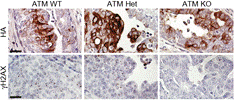Veterinary and Biomedical Sciences, Department of
Document Type
Article
Date of this Version
11-8-2022
Citation
Won et al., 2022, Cell Reports 41, 111611 November 8, 2022. https://doi.org/10.1016/j.celrep.2022.111611
Abstract
Immune checkpoint inhibitors (ICIs) are an effective therapy for various cancers; however, they can induce immune-related adverse events (irAEs) as a side effect. Myocarditis is an uncommon, but fatal, irAE caused after ICI treatments. Currently, the mechanism of ICI-associated myocarditis is unclear. Here, we show the development of myocarditis in A/J mice induced by anti-PD-1 monoclonal antibody (mAb) administration alone without tumor cell inoculation, immunization, or viral infection. Mice with myocarditis have increased cardiac infiltration, elevated cardiac troponin levels, and arrhythmia. Anti-PD-1 mAb treatment also causes irAEs in other organs. Autoimmune T cells recognizing cardiac myosin are activated and increased in mice with myocarditis. Notably, cardiac myosin-specific T cells are present in naive mice, showing a phenotype of antigen-experienced T cells. Collectively, we establish a clinically relevant mouse model for ICI-associated myocarditis and find a contribution of cardiac myosin-specific T cells to ICI-associated myocarditis development and pathogenesis.
Included in
Biochemistry, Biophysics, and Structural Biology Commons, Cell and Developmental Biology Commons, Veterinary Infectious Diseases Commons, Veterinary Microbiology and Immunobiology Commons, Veterinary Physiology Commons



Comments
Open access.